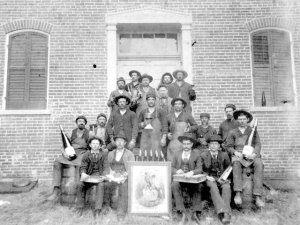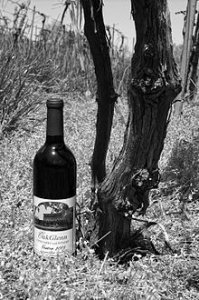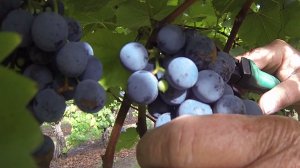KANSAS CITY, Mo. — The state of Missouri is a hot spot for wineries.
According to a study from Wine & Vines published in 2018, there are around 8,391 wineries in North America. About 7,760 of those wineries are in the United States.
California leads the country in wine production with 3,674 wineries. But Missouri is one of 13 states that have more that 100 wineries with 125 locations. Kansas has 23 wineries. (Scroll to the bottom for a list of wineries in the KC area.)
History of Wine making in Missouri and Kansas
Before European immigrants settled in the Midwest, some Native American tribes had cultivated grapes. European settlers further developed these practices.
Organized wine production in Missouri and Kansas took off in the early 19th century. German immigrants laid the groundwork for the wine industry, earning the nickname and reputation as the “Missouri Rhineland.”
The immigrants helped create planting routes along the Mississippi and Missouri Rivers — the thriving grape and wine culture spread west to as far as Russell in central Kansas. Later Italian immigrants moved to Missouri, and they offered their skills in transforming the Show Me State into a global wine center.
In the mid-1880s, more wine was produced by volume in Missouri than any other state.

In the 19th century, a German immigrant hub in Hermann, Missouri became an epicenter of wine activity.
Stone Hill Winery in Hermann became the second largest winery in the nation in 1880, and it was the third largest winery in the world. Stone Hill shipped a million barrels of wine by the turn of the 20th century. Its wines won awards at world fairs in Vienna in 1873 and Philadelphia in 1876.
In the present, the eastern Missouri city continues to be a destination site for wine enthusiasts. Hermann produces a third of Missouri’s wine.
The prohibition era forced the shutdown and abandonment of all Missouri wineries with the exception of the one at St. Stanislaus Seminary, in Florissant. The state permitted the seminary to produce sacramental wines.
The wine industry in Missouri didn’t recover for decades. Kansas also struggled to bring back a wine industry following prohibition.
The state was home to Carrie Nation, a radical and pioneer of the early temperance movement. Kansas was the first state in the union to pass statewide prohibition in 1881.
Despite the alcohol ban, winemakers in Kansas secretly continued to ferment juices.
In 1900, just 20 years after prohibition in the Sunflower State, “The Grape in Kansas” documented vineyards in thousands of acres of Kansas land. The state horticultural society published the report.
It further found people routinely planted, grew, and harvested grapes — and most of those grapes ended up in bootleg operations in Kansas or were sold across the state line to Missourians.
Decades after Prohibition
Stone Hill Winery in Hermann finally reopened in 1965. Winemakers in the ‘60s and ‘70s reestablished Missouri vineyards and wineries along the Mississippi River and throughout the state.
Missouri had the first area recognized as a federally designated American Viticultural Area with the Augusta AVA acknowledged on June 20, 1980. The state now has four AVAs.
In 1983, Hermann earned the designation of an AVA. The Ozark Highlands AVA, created in 1987, includes parts of Gasconade, Texas and Dent counties. All three smaller AVAs are within the Ozark Mountain AVA, which covers southern Missouri below the Missouri River, northwestern Arkansas and northeastern Oklahoma.
Missouri’s climate makes it an excellent place for handling grapes. Long, hot summers, plenty of sun exposure, and thin yet rocky soil are all ideal factors for cultivating the fruit. Moderate temperatures allow for the natural cellaring of wine.

The most prominent grape variety grown in Missouri is the Cynthiana/Norton. Norton is the official grape of the State of Missouri and is considered the cornerstone of the state’s wine industry.
Historians believe Dr. Daniel Norton first cultivated the grape in Richmond, Virginia during the early 19th century. He developed the cultivar from seeds from a now extinct variety (Cynthiana may be a mutation of the original Norton).
The grape variety is now grown in the Midwest, Mid-Atlantic States, and in California.
Other grapes grown in Missouri include: Native American grapes, Concord and Catawba; and French-American hybrids, such as Vignoles, Seyval, and Chambourcin.
Missouri has more than 1,600 acres planted in grapes. In 2008, sellers sold more than 888,000 gallons of Missouri wine. The wineries are supported by more than 400 local vineyards. A large portion of the wineries are considered small “mom and pop” shops.
The four largest wineries are: the St. James Winery, Stone Hill Winery, Les Bourgeois Winery, and Meramec Vineyards Winery.
The state has five wine trails, which host wine events and festivals year round.
Legislators passed a state tax on wine in 1984, which is now at 12 cents per gallon. The tax supports the state Missouri Wine and Grape Program, which does research and marketing to support wine production.
The state hired a viticulturist to assist in revitalizing the wine industry. Wine in the state has helped spearhead tourism in communities both small and large.
Missouri State University in Springfield has a program dedicated to teaching students about careers in wine. The Missouri State University’s Mountain Grove cellars is a university-owned and operated wine grape producing vineyard. The University of Missouri’s Grape and Wine Institute does research on winemaking practices in Missouri and the Midwest.
Popular Wineries & Vineyards in the Kansas City Area
The Kansas City metro has a wide variety of wineries and vineyards — some are even considered haunted. Many of the wineries in the area double as venues for weddings and special occasions. Most locations have tasting rooms or other amenities.
The metro offers several wine tours, classes, and tools to procure the perfect drink.
Amigoni Urban Winery produces handcrafted wines in the Stockyards District of Kansas City’s Historic West Bottoms.
The team focuses on traditional European grape varietals, such as Chardonnay and Viognier. The wines are often produced from grapes grown in the northern portion of California’s Central Valley.
The Amigoni Family Vineyard was established in 2000.
Michael Amigoni took up winemaking as a hobby and then fell in love with the craft and wanted to start a business. After planting some vines, the family decided to open a commercial winery.
In 2011, renovations began on the current tasting room, which is located in the Daily Drover Telegram Building across the street from the original Amigoni location.
In 2017, the owners moved production from a nearby facility to the Telegram building.
Tasting of 5 wines costs $8 per person. The winery is open Tuesday, Wednesday, Thursday, and Saturday from 11 a.m. to 6 p.m. It also opens Friday from 11 a.m. to 7 p.m. and on Sunday from noon to 5 p.m.
Aubrey Vineyards in Overland Park: It all started back in 2010 with the purchase of approximately 200 acres in Overland Park. The land was still in use by farmers.
After a trip to Napa, a vision unfolded to ready the land to grow grapes, develop wines, and use the space as a venue for events. Workers plant the grapes just south of River Ridge.
The land has loamy soil and is low in clay content, which is ideal for grape vines. The high elevation allows for breezes to go through the vines and ward off diseases. The slopes and porous loam keep the soil well-drained.
Aubrey Vineyards has a tasting room and a store in downtown Overland Park.
With summer here, Aubrey Vineyards has introduced the June wine of the month: Trail Rider White. It’s meant for cookouts, grilling brats, or enjoying an evening on the patio. The wine has notes of granny smith apple and crisp pear.
Barley Bus Tour: for those looking for a history lesson and have several hours to kill in the morning or afternoon.
The tour takes guests to breweries, wineries, and distilleries. It also includes history about Kansas City and the surrounding areas. Guests will be treated with alcohol samples, water and snacks.
The brewery tour lasts about 4 hours, and the winery tours take about 5 hours.
There’s a long list of places you might visit on a tour, which includes: Cinder Block, Boulevard Brewing Co, Crane Brewing, Union Horse, Pirtle Winery, Stone Pillar Vineyard & Winery, and Jowler Creek Vineyard & Winery.
ou can find the full list on the Barley Bus Tour website.

Belvoir Winery and Inn: The historic property in Liberty is considered haunted by many.
The venue offers free wine tastings, paranormal investigations, and it hosts weddings.
One wine, called “Boo’s,” is a fortified dessert wine with heavy layers of dark berries and chocolate created by the Norton grape and mixed with Missouri brandy. Belvoir also offers more traditional red and white wines.
The Odd Fellows’ Home complex was built circa 1900. Three buildings from the original property remain: the Administration Building, the Old Folks Building, and the Old Hospital.
Guests and staff have reported hearing unusual noises and seeing strange sights on the property. It formerly served as an orphanage and a retirement home, which this may add to the spooky lore.
The Belvoir recently opened up a nine-room bed and breakfast on the third floor of the main building.
The winery in Liberty could be one of the only spots in the Kansas City metro where you can share a wine of glass with a ghost or other lingering specter.
Cooper’s Hawk Winery & Restaurant: The winery produces around 700,000 cases of wine each year.
Most of the grapes come from California, Washington, and Oregon.
Cooper’s Hawk seeks for the best fruit to produce the best wine. The winemaker is selective about picking fruits and is sensitive to the time of year. In some parts of the country, seasonal conditions have an impact on taste.
Cooper’s Hawk has received more than 500 wine awards from various local, national, and international wine competitions.
The company has a wine club for members. It includes an updated list of wines each month, discounts, birthday rewards, and invitations to member-only events.
Fence Stile Vineyards in Excelsior Springs: This winery has wine caves.
Guests can tour the facilities, enjoy wine tastings and other beverages, and purchase merchandise. Guests can enjoy a glass of wine on the patio or in the indoor tasting room.
There is also a fire pit outside that’s meant to act as a gathering place for friends and family. Private tastings and tours of the winery and wine caves are available.
The vineyard has planted 8 different varietals on the property.
Holy-Field Vineyard & Winery in Bachelor, Kansas: Winemakers use grapes harvested on 14 acres. There are 10 grape varieties that produce 19 distinct wines. Holy-Field has earned awards nationally and internationally.
The wine venue also hosts a number of entertainment events throughout the year, including Murder Mystery Dinner Theatre shows, Mayfest, the Summertime Music Series, and Oktoberfest.
The vineyard, banquet hall, and gazebo are available for weddings, receptions, and other events by reservation.
KC Wine Co: The boutique winery brings in its fair share of sweet fruits for wines.
The Barrel Room at KC Wine Co. is a vintage-inspired space meant for events. From private parties to large group tastings, 100 people can fit in the climate controlled room comfortably.
For more information head to the KC Wine Co. website where you can schedule a tour or receive pricing information.
KC Wineworks: Established in 2014, the winery has taken in awards over the past few years.
The winery uses 100% locally sourced grapes from Missouri. Wine tastings are available and come with views of the oak barrels used in the process.
Reservations are required for parties of 6 or more people with a maximum of 20 people.
Ladoga Ridge Winery in Smithville: Founded in 2011, the winery is nestled just north of Kansas City.
It offers wine tastings during normal business hours. Tastings may vary during special events.
The venue regularly hosts concerts. It is a family-owned and operated winery and vineyard. It is one of the more picturesque vineyards in the area with trees, sprawling land, pastures, and other natural delights.
Wine enthusiasts are encouraged to drink handcrafted wines from the winery and enjoy the scenery.
Mallinson Vineyard & Hall in Sugar Creek, Missouri: Guests can stay in the newly remolded Norton House that overlooks the vineyard there. There is an outdoor wedding site with a large patio for guests.
The small local winery has a shorter list of wines, but it has a beautiful and romantic vista for those willing to take on a day trip or other adventure.
Rowe Ridge Vineyard & Winery: The vineyard and winery are located north of the Kansas Speedway and the Legends shopping center.
Owners Marc and Pamela Rowe planted the first vines in 2005. They grow nine varieties of hybrid and American native grapes.
The tasting room was built in 2012. Ten wines are available for sampling. The deck and tasting room are handicap accessible. There is also a gift shop and spot to fish.
Wine flights are $8 and include six to eight wines and a souvenir logo wine glass to take home. The owners are home most days to lead vineyard tours and answer questions on grape cultivation. Groups of 6 or more are encouraged to make reservations.
Stonehaus Farms in Lee’s Summit: Founded in 1996, the family operated winery intends to have a warm and inviting family atmosphere.
The tasting room was updated to showcase the original “Stone Wall” that gave the winery the Stonehaus Farms’ name. The venue is open to weddings and other special events.
The website for Stonehaus Farms regularly posts updates and information about upcoming events. The venue hosts a wine and paint class on Wednesday nights by RSVP.
Stone Pillar Vineyard & Winery claims to be Johnson County’s original farm winery. It is located southwest of Kansas City in Olathe.
The Hoff family has farmed the land since before the Civil War. George and Brandi Hoff wanted to start a winery after taking a vacation to Canada to see Niagara Falls in 2004. They planted the first vines in 2007.
The family works closely with their own vines and their local growers to ensure a high quality hand-picked Kansas wine.
Top Hat Winery in Independence is a family-owned winery located on the historic Independence Square. The location offers a fun atmosphere for guests. The space is meant for both novice wine drinkers and connoisseurs.
Top Hat Winery also offers hard ciders along with its line of handcrafted wines. The winery offers red, white, fruit, and specialty wines.
The business operates in the building formerly occupied by Elena’s Catering and Carryout. There is no on-site vineyard.
The owners purchase grapes and berries from all over Missouri and beyond. The fruit is then processed into juice and fermented in-house.
As a domestic winery, 85% of the wine Top Hat manufactures must be grown in Missouri. For the Concord grapes, the owners travel to a premier region in western New York.
The name “Top Hat” comes from a love of hats and a focus on premier products.











